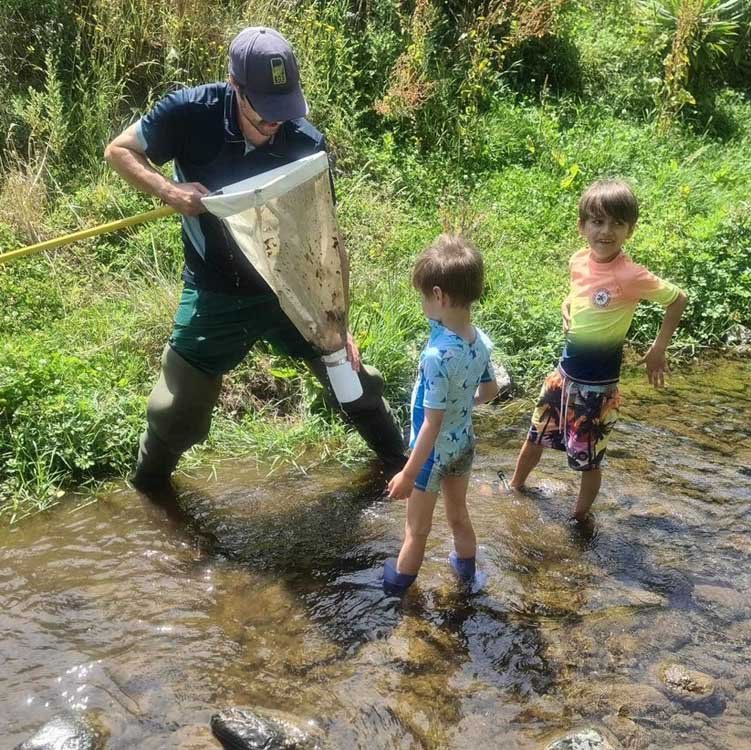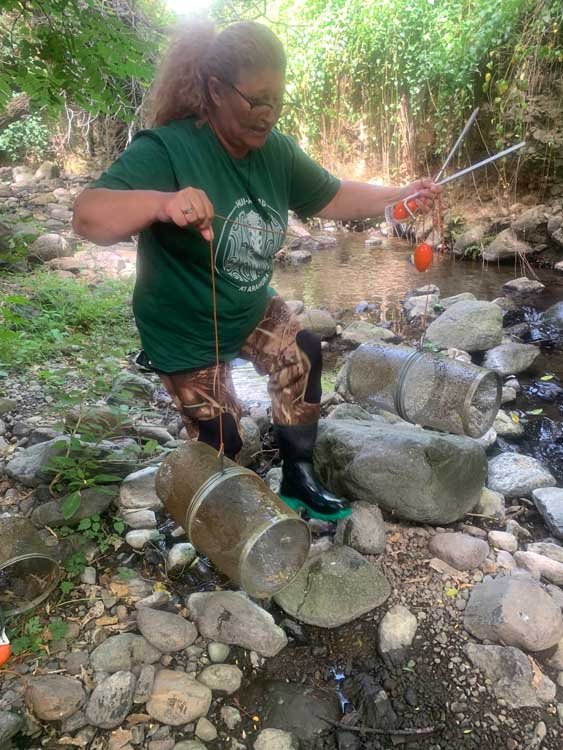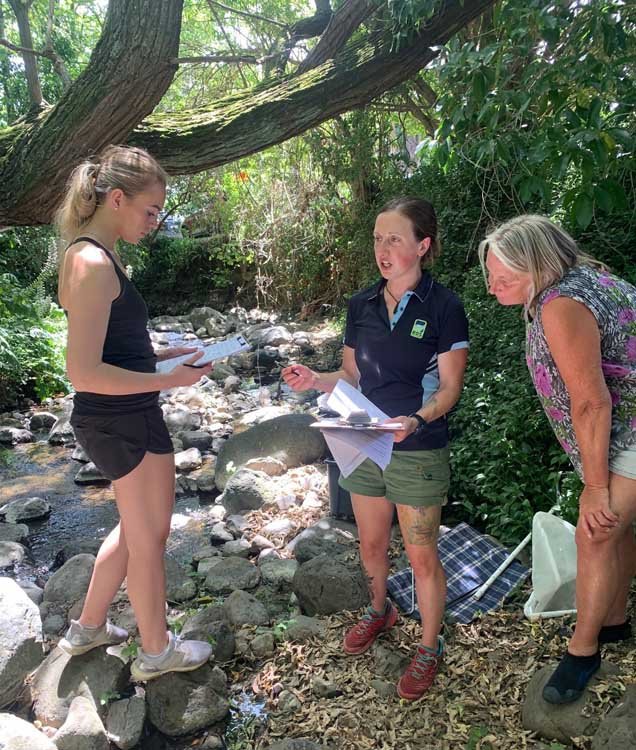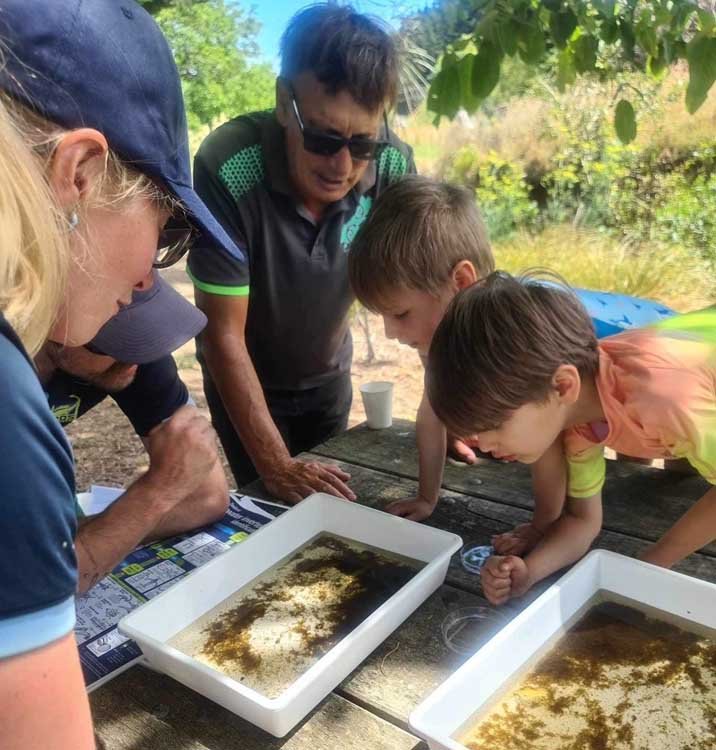Ōnuku climate change wānanga
Group photo of all those who attended Te Kori a te Kō – climate change adaptation planning day. Photo Credit: Ōnuku Rūnanga.
Our Climate Change Adaptation Wānanga took place in sweltering heat; a stark reminder of the kaupapa at hand. We hosted three days of workshops, expert panel discussions, and activities at Ōnuku Marae from January 19 to 21.
Ōnuku Rūnanga chair Rik Tainui says the wānanga, titled Te Kori a te Kō, was a great success.
“We had whānau, community representatives, climate science experts, and local government folks all in the same place, talking about what we can do now to enhance our future. Te Kori a te Kō lined up beautifully with our iwi whakataukī – Mō tātou, ā, mō kā uri ā muri ake nei (for us and our children after us),” Rik Tainui says.
Organisor and Te Taiaio Portfolio Manager for Ōnuku, Debbie Tikao, says the idea for the wānanga sprung from wanting a mahinga kai management plan for Akaroa Harbour in 2019.
“Through that mahi, we realised we need to think bigger so we expanded to integrate climate change.”
The three-day event kicked off on Friday 19 January with kōrero designed to develop an understanding of how climate change will affect Akaroa Harbour and communities and Ōtautahi. Its purpose was to lay the groundwork to prepare whānau for challenges ahead.
Debbie Tikao says a lot is already being done locally to mitigate and adapt to climate change, citing exploring kelp farming in the harbour, reforestation on Banks Peninsula, and education initiatives.
“Te Kori a te Kō is about what’s next,” she says.
The first day of the wānanga featured a panel of experts: Dr Fiona Shanhun, Chief Scientist and leader of the climate change resilience program for Environment Canterbury; Sonny Whitelaw, coastal geomorphologist, and advisor on climate change adaptation to Te Rūnanga o Ngāi Tahu, Justin Cope, Principal Advisor (Natural Hazards) at Environment Canterbury, and Tom Simons-Smith, Christchurch City Council’s Principal Advisor Coastal Adaptation and the technical lead on Council’s Coastal Hazards Adaptation Planning process.
Antarctica scientist Dr Fiona Shanhun spoke about how the icy continent connects to New Zealand, and the rest of the world for that matter. Temperatures, wind, animal migration – Antarctica has a significant impact on all of these.
“If all the ice melted, the sea would rise 60 metres,” she says.
Tom Simons-Smith spoke about the impact of sea level rise in Ōtautahi, showing data visualisations of how sea level rise would flood areas such as Sumner and Redcliffs. And Sonny Whitelaw explained that the marine heatwaves we have experienced in recent years will become the average condition before the end of the century.
It was alarming.
Debbie Tikao is urging optimism despite the depressing reality. “It’s important we can visualise the potential impacts such as residential areas being inundated but equally, we have to be buoyant about our ability to mitigate and adapt.” She says the whānau adaptation challenge led by rangatahi was a real highlight of the wānanga.
The aim of the challenge was to get whānau thinking about what they can do at home to prepare for our changing environment and how they can reduce their own carbon footprint.
Whānau adaptation challenge – for this game we split into three groups. Each group was made up of whānau, one of our rangatahi, climate change experts, Akaroa community leaders and representatives from Christchurch City Council.
“The challenge resulted in ideas that extended well outside of the box. It was fun, insightful, and highly competitive. Each group had to argue why their adaptation plan was the best. Our three young judges, Marama, Miriama, and Ramari, had one judging criteria – which plan would make them feel the safest? All plans were amazing, but group two won the prize.”
An example of one of the whānau scale adaptation plans.
Another high of the three days was the ‘Stream Off’ activity on the second day. This involved testing water quality and identifying taonga species in three local streams – Pakai-ariki (Aylmers Stream), Takamatua, and Te Wai iti (Belgueri). This was led by Environment Canterbury’s Channell Thoms, Mātauranga Putaiao Senior Advisor and Freshwater Ecologist, and EOS Ecology’s team of 5 freshwater ecologists and educators Oly Hall, Courtney Boss, Kate Monteath, Jessica Halsey and Nick Hempston.
Amiria Tikao, one of our rangatahi climate change leaders said: “Ōnuku whānau loved spending the weekend with these amazing ecologists. We all felt very lucky and privileged to have them sharing their extensive expertise and knowledge with us. We learned so much, I had no idea there was so much life in the streams.”
The stream that got the winning prize for having the most abundance of mahinga kai and the healthiest water was Pakai-ariki. It was full of native manu and had a near-complete canopy cover.
“We finished up on Sunday with a walk through The Garden of Tāne and a kōrero from Ōnuku education portfolio leader Jess Rogers about the creation story and the role of Tāne Mahuta, followed by a walk through Tākapūneke with a kōrero from Adrian Boardman. After the hikoi, we returned to the marae for our last wānanga on rongoā,” says Debbie.
Group photo at The Garden of Tāne. New whānau from Queenstown joined in for the day, so so awesome getting to know each.
“We wanted to finish up with a boost of well-being and to add a new bit of mātauranga to our kite, which might help us be more resilient and self-sufficient in the future. Rongoā practitioner Raukohe Hallett talked to us about the tikanga of rongoā and showed us how to make kawakawa balm.”
Debbie says she is thankful to all the people who made the wānanga happen.
“Ōnuku Rūnanga would like to thank Te Rūnanga o Ngāi Tahu for your funding and support across many aspects of the climate change adaptation process; Environment Canterbury for the Kaitiakitanga /Mātauranga Māori funding and expert advice and support for both the wānanga and developing the streams booklets; EOS Ecology for running the streams education program and input into the booklets; and Christchurch City Council for contributing to the costs of hosting the wānanga with community and whānau, and participating in the event. We would like to thank our mind-blowingly knowledgeable climate change panelists, Fiona, Sonny, Tom, and Justin, and our awesome bunch of ecologists from EOS Ecology and ECan. We also want to thank our whānau, rangatahi and community leaders who took time out of their busy lives to be part of this massive conversation. We still have a long way to go, but feel we’re now off to a good start. We can’t wait to do it again.”
We thank Ōnuku Rūnanga for their permission to share this article and photographs.







